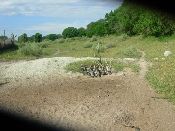 |
The dissemination strategy for this study site identifies a number of different target audiences to whom information and results from the project can be addressed. The contents of messages, the format in which they are delivered and their expected impact vary from one audience to another. |
1. Local and regional stakeholders
|
| Location |
Dzhanibek study site, Volgograd Region, Russia |
| Message |
Summaries and syntheses of information and technologies adopted (drip irrigation) and developed (variable rate irrigation) at Dzhanibek study sites. |
| Product format |
Presentations, Booklet, Poster
Written material in field trips and conferences
Video
DESIRE-HIS in Russian
WOCAT in RUSSIAN |
| Method of dissemination |
Field trip
Web pages of DESIRE, WOCAT
DESIRE-HIS
Conferences
Seminars |
| Expected impact |
Interest in DESIRE project
Interest in drip irrigation and variable rate irrigation technologies
Interest in DESIRE-HIS
Interest in WOCAT |
2. Policy makers at regional and national levels
|
| Location |
DESIRE project
DESIRE-HIS
WOCAT
|
| Message |
Summaries and syntheses of DESIRE results and messages appropriate derived at both Russian study sites on soil improvement, variable dose sprinkler irrigation technology; water scarcity, and drip irrigation. |
| Product format |
|
| Method of dissemination |
Represent DESIRE at policy meetings at national level. |
| Expected impact |
Inclusion of developed DESIRE technologies and approach and SLM technologies in national program of land reclamation. |
| 3. Researchers and teachers |
| Location |
National level, Moscow, Russia |
| Message |
Soil and water resources degradation and desertification processes.
WOCAT technologies.
DESIRE-HIS.
Training courses |
| Product format |
Power point presentations.
Contributions.
Posters and leaflets, newsletter. |
| Method of dissemination |
Environmental information system website; presentations at meetings; training sessions. |
| Expected impact |
Technicians and researchers awareness regarding land and water resources degradation and SLM; capacity building of researchers and technicians on the best SLM practices. |
|




